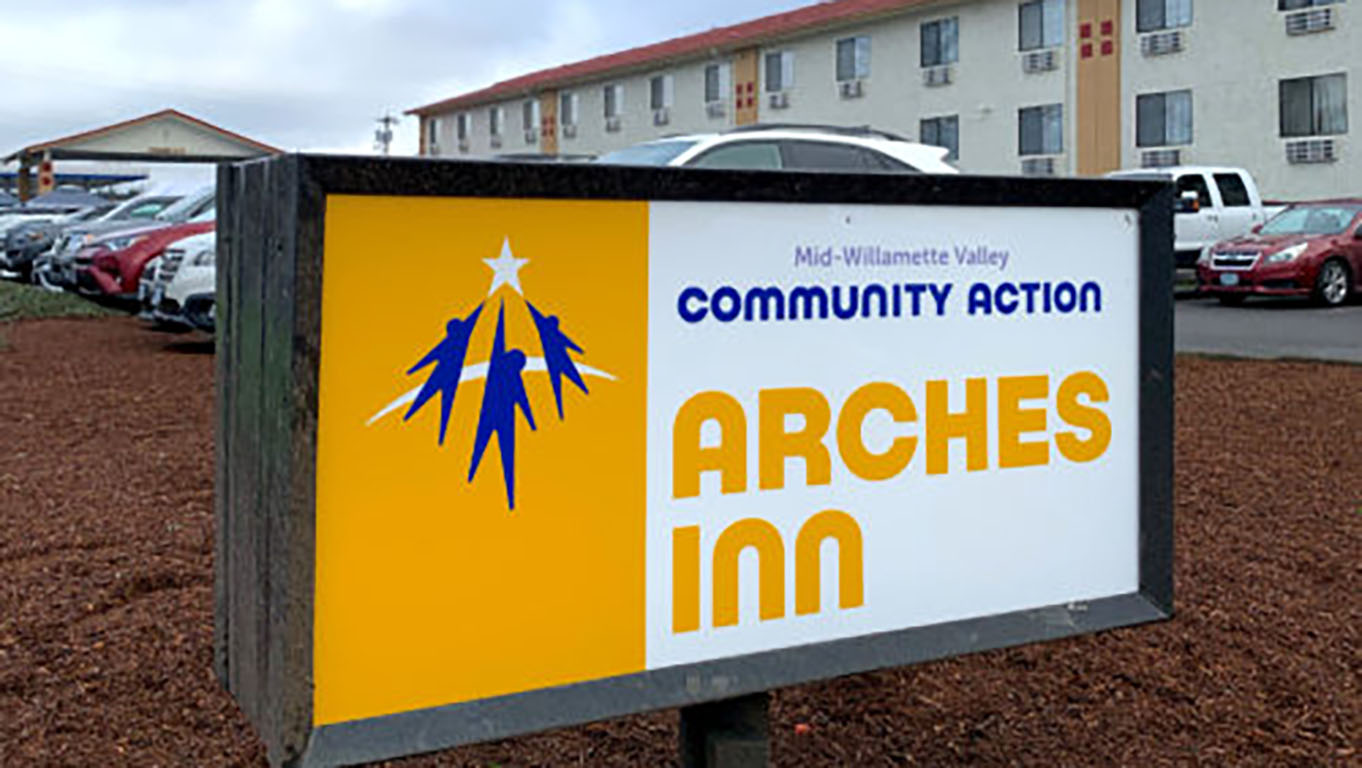There has been a lot of talk about housing as the Kotek Administration prioritizes solutions to the state’s housing crisis. Project Turnkey, an Association of Oregon Counties (AOC) supported program, is one of several models being deployed to provide targeted solutions tailored to community needs.
Last month, Oregon Governor Tina Kotek joined Polk County Commissioner Jeremy Gordon, AOC Executive Director Gina Firman Nikkel, and community leaders for the ribbon cutting of the Project Turnkey property, ARCHES Lodge in northeast Salem.
ARCHES Inn, a former hotel, was purchased by Mid-Willamette Valley Community Action Agency (MWVCAA) using grant funding from several sources, including $3.5 million from the second tranche of Project Turnkey’s investment from the state. The region has identified veterans and people with acute health needs, including unsheltered people being released from clinics or emergency rooms, as its priority population for shelter and services.
True to the intent of the program, each local community focuses on specific housing and services tailored to the needs of their guests. Some recipients of the funds used the program to uplift community members impacted by wildfire, some for those transitioning following substance use recovery, some for transitional housing for youth, and some for survivors of domestic violence.
Since 2020, the State Legislature has invested close to $125 million in Project Turnkey. In the first tranche of funding, the program added nearly 900 units of shelter for Oregonians in need through the conversion of 19 motel sites in 13 counties around the state. In the second tranche of funding, which is being deployed through June of 2023, it is expected that an additional 500 units of shelter will be created.
“Project Turnkey was really a culmination of the pandemic, wildfire, and general housing crisis in Oregon. And, with my background in mental health, and the work that counties do to support our residents through wraparound services, it was clear that housing was one of the first critical steps in addressing mental health needs for Oregonians,” Nikkel said.
Following that conversation, AOC formed and co-convened a workgroup with the League of Oregon Cities (LOC), inviting legislators and other housing stakeholders to the table to identify how to achieve solutions that best served Oregonians. Oregon Community Foundation (OCF) staff engaged in the convening and feasibility study of the model. Ultimately, OCF served as fiduciary and grant administrator for the implementation of the program. This group worked closely with Kotek, who, at the time, served as Speaker of the House, for the initial investment in the program.
Nikkel is grateful for the governor’s engagement with the program. “Governor Kotek was a strong advocate for the program in her tenure as Speaker of the House and now as governor. She continues to be a strong partner for counties.”
With the strong success in the first phase of the program, Project Turnkey saw an infusion of $50 million more from the state in 2022. Organizations around the state applied for the opportunity to purchase motels, hotels, and other existing structures and utilize them short-term as shelter or temporary housing. Longer term, the properties may convert to permanent housing as the local housing needs shift and evolve.
OCF, the administrator of Project Turnkey, is continuing its work, guided by a statewide Advisory Committee. The second tranche of $50 million in funding is being awarded to new sites around the state, and in alignment with legislative direction for the funds, all acquisitions will be completed by June 30, 2023.
Eligible property types include hotels, motels, and other vacant properties that can readily and affordably be converted to non-congregate shelter such as duplexes, apartment complexes, care facilities, or dormitories.
Nikkel serves on the Advisory Committee that reviews Project Turnkey applications and recommends awardees for funding. She said the second tranche of funding brought 32 applications from regions around the state.
“The need for housing is great, and while Project Turnkey is one of several pieces needed to address the housing crisis, it is not the only set of housing we need, Nikkel stated. We need people to move up – from shelter beds to middle housing, and so on.”
There was no direct request for funding for the 2023 Legislative Session, but conversations continue. Nikkel met with Kotek in early April and discussed the success of the program.
As Project Turnkey properties launch in communities around the state, counties are working with community partners to provide wraparound services to program participants. Each site is uniting community partners to offer the right resources to each guest to help them stabilize and move to permanent housing.
AOC, LOC, and partners continue to convene to address future housing solutions. Partners include: CASA of Oregon; Hacienda CDC; Network for Oregon Affordable Housing; Oregon Emergency Management; Oregon Community Foundation, Oregon Health Authority; Oregon Housing and Community Services; Oregon Restaurant and Lodging Association; Oregon Community Foundation; Oregon Housing Stability Council Chair and Lincoln County Commissioner Claire Hall; former Morrow County Commissioner Jim Doherty; State Representative Pam Marsh (D-Ashland); and former State Representative Alissa Keny-Guyer (D-Portland).
Contributed by: Mckenzie Farrell, AOC operations director
